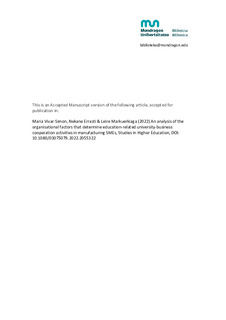Izenburua
An analysis of the organisational factors that determine education-related university-business cooperation activities in manufacturing SMEsArgitalpen data
2022Bertsioa
PostprintaDokumentu-mota
ArtikuluaArtikuluaHizkuntza
IngelesaEskubideak
© 2022 Taylor and FrancisSarbidea
Sarbide bahituaBahituraren amaiera data
2023-09-30Argitaratzailearen bertsioa
https://doi.org/10.1080/03075079.2022.2055322Non argitaratua
Studies in Higher Education Early AccessArgitaratzailea
Taylor and FrancisGako-hitzak
University Business Cooperation
Mobility of students
Dual education
Curriculum co-development ... [+]
Mobility of students
Dual education
Curriculum co-development ... [+]
University Business Cooperation
Mobility of students
Dual education
Curriculum co-development
Lifelong learning
Organisational context-related factors [-]
Mobility of students
Dual education
Curriculum co-development
Lifelong learning
Organisational context-related factors [-]
Laburpena
Cooperation between universities and business is manifest in a wide range of activities related to the three missions of the entrepreneurial university: education, research and entrepreneurship. Howev ... [+]
Cooperation between universities and business is manifest in a wide range of activities related to the three missions of the entrepreneurial university: education, research and entrepreneurship. However, the vast majority of University-Business Cooperation (UBC) literature has focused on R&D-related activities. This bias has given rise to a lack of knowledge of the organisational context-related factors that shape businesses’ cooperation with universities. In order to address this research gap, this quantitative study, by means of a series of multivariate linear regression models, identifies the organisational context-related factors that determine manufacturing SMEs’ cooperation levels in education-related UBC activities. Applying a questionnaire to a sample of 332 manufacturing SMEs located in the Autonomous Community of the Basque Country (Spain), the impact is analysed of organisational context-related factors – general business characteristics, business openness, R&D, innovation, and UBC willingness and support – on 5 types of UBC activities that have been identified and classified in the field of education, namely, mobility of students, dual education, curriculum co-design, curriculum co-delivery and lifelong learning. [-]





















